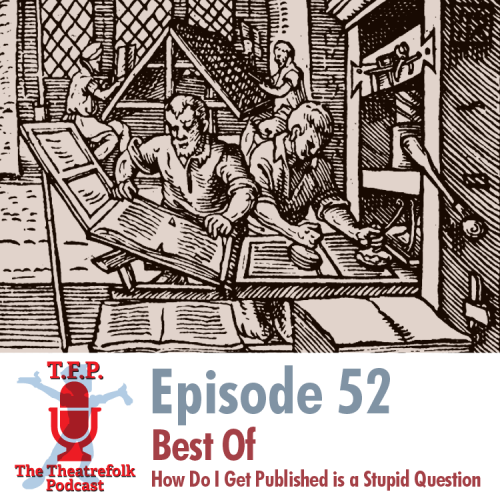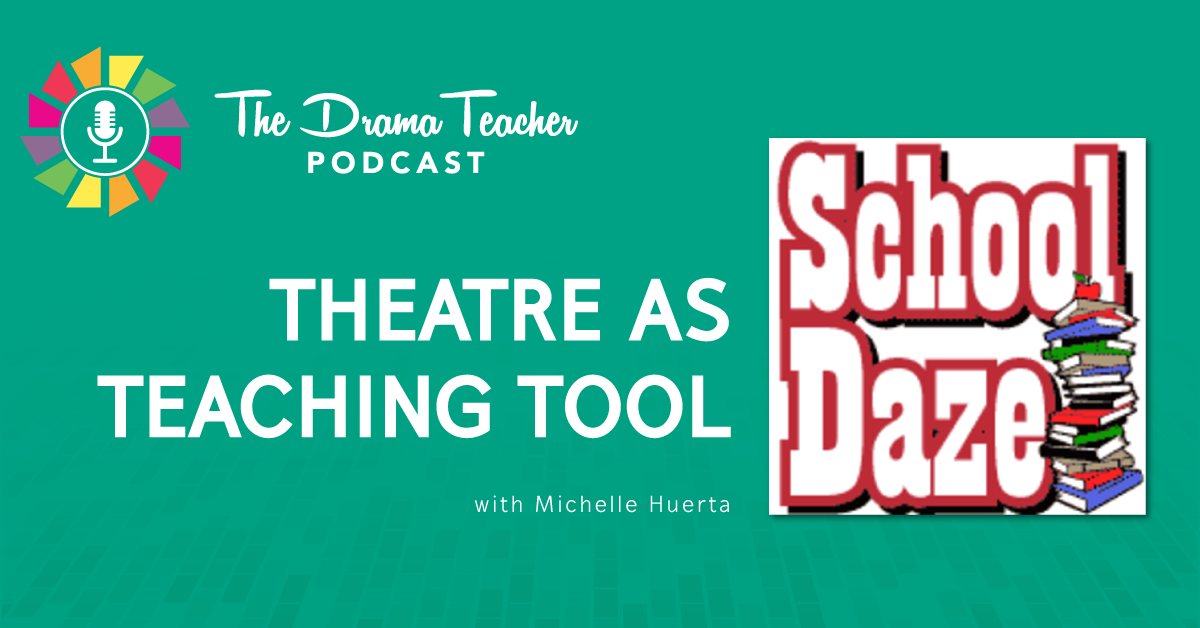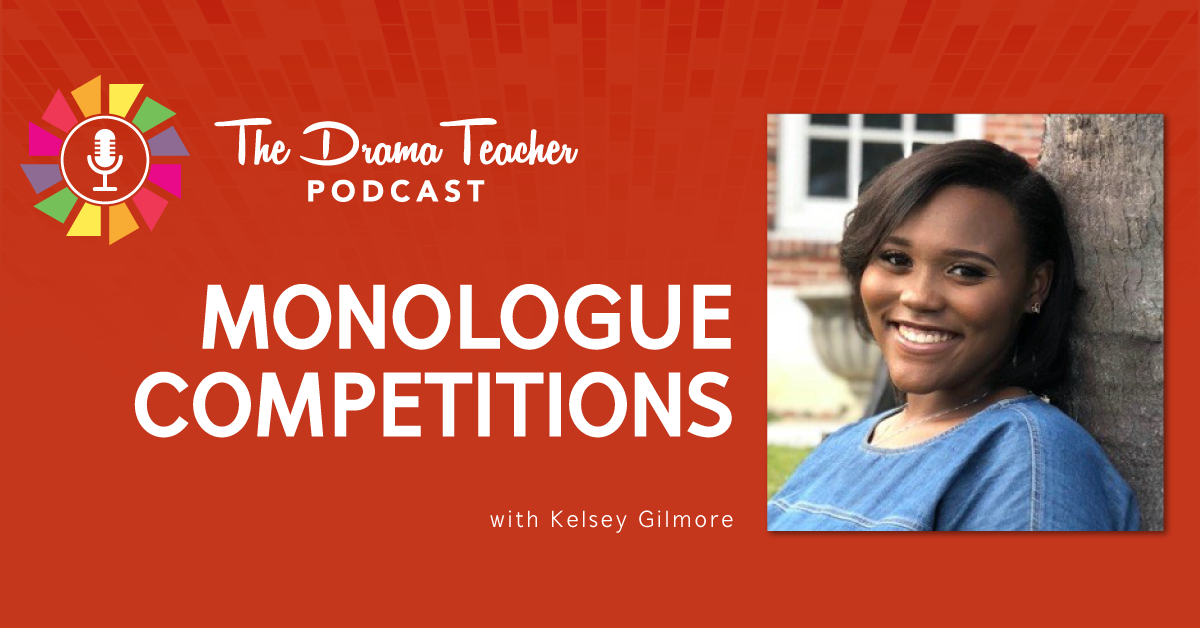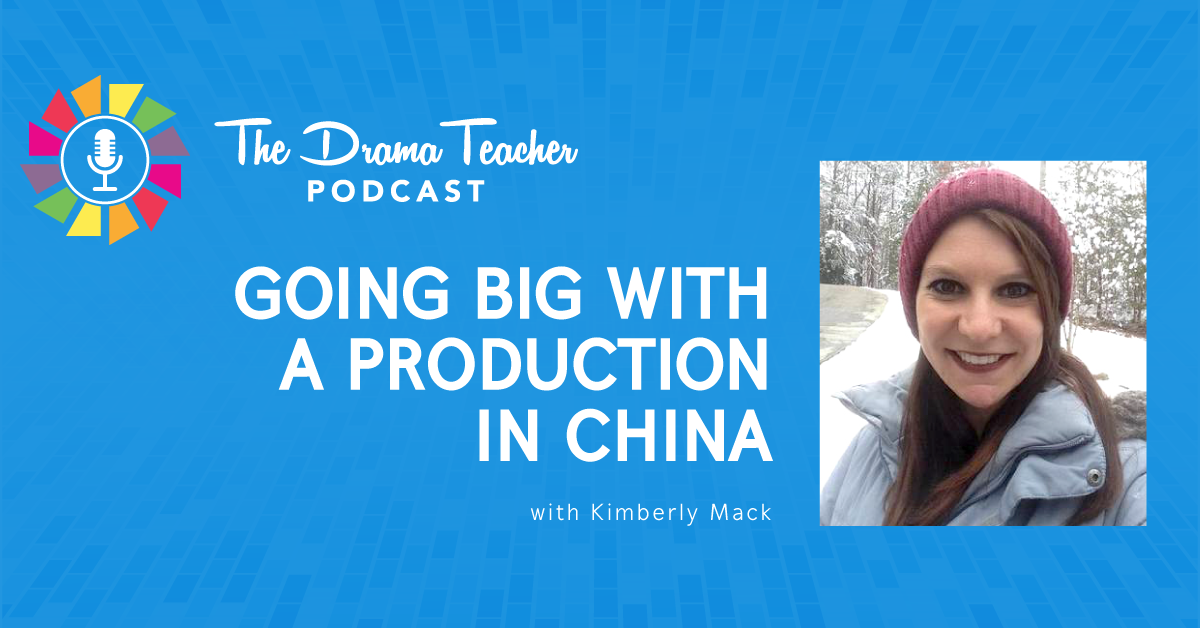Podcast Best Of: “How do I get Published” is a stupid question
Episode 52: Best Of
This week we look back at an episode from the past year. “How do I get published” is the question that every writer asks and yet it’s the wrong question. It’s also the worst question a beginning writer can ask an established writer. If you have a play script burning in a drawer, listen to learn what questions to ask.
Show Notes
- Nice Girl by Amanda Murray Cutalo
Subscribe to The Theatrefolk Podcast
Episode Transcript
Welcome to TFP, the Theatrefolk podcast. A microphone. A foam box. And you. I am Lindsay Price, resident playwright for Theatrefolk. Hello, I hope you’re well, thanks for listening.
Today we’ve got one more look back before we head into the “new year” as it were with new podcasts. This podcast is from October and deals with a question I get all the time. It’s also the wrong question a young playwright with a playscript sitting in a drawer can ask. Let’s get to it.
Episode Eleven: How do I get published is a stupid question.
So, let’s set a few things straight before I get rolling. Yes, I’m aware that the title of this episode is inflammatory. Of course, it is! Are you really going to listen to a podcast where the title is, “How do I get published is an easy and nice question?” or, “How do I get published and all the fluffy bunnies and unicorns?” Oh, I don’t know. Maybe you’d listen. I think I’d listen. I’m partial to a fluffy bunny. Nonetheless, it’s a statement. “How do I get published is a stupid question.” It’s also something that I believe. I’m not just throwing it out there to be inflammatory. It’s something I stand behind because of the vast number of situations I have been in where this question has been asked of me, and in the vast majority of those times, it’s the absolute wrong question.
Second, obviously, I am only speaking of playwrights. I am a playwright. That is what I write. That is what I know. I don’t really know a darn thing about being a novelist, a short story writer, or a poet. So when I say, “How do I get published is a stupid question,” I’m talking about playwrights. So, don’t get your knickers in a knot if you’re a novelist, a short story writer, or a poet and being published is your endgame. Go find a novelist podcast and get your knickers in a knot over what they have to say.
So, here’s the scenario. I’m at a conference. I’m presenting a workshop. I’m at the Theatrefolk table and I’m talking with a student, a young writer just starting out, and the question comes up. “How do I get published?” And they look at me like I have that basket, that basket full of fluffy bunnies and unicorns, and they’re expecting me to hand over the basket, “Here you go! All the answers you require plus a big basket of cute! What better thing is there?” Here’s the thing, they ask one question — “How do I get published?” — and they expect there is only one answer. And that it’s an easy answer — easy for me to provide, easy for them to understand. They expect that there is a brochure that I can pull out of my purse at a whim, at a moment’s notice, and that I carry a bounty of such brochures that has all the steps laid out in color, in three dimensions. Now that’s a brochure, huh?
I don’t think people who ask the question are stupid. There is a distinction. It’s not the people, it’s the question because I know why they ask. I was not beyond asking such a question when I was a young writer. When I was young, oh! When I started out I believed with all my heart that there was an easy step-by-step process to succeeding as a playwright. We see the example of those who come before us and it makes sense to copy that example, to pick what someone else has done as the thing we are supposed to strive for. We see the potential endgame because others have done it and succeeded at it so it’s natural to go, “Well, I can do that. I can do that, too.” And when we want to write, the thing that seems to make you a writer, that says you’re a professional, the crest on your blazer, is being published. I’m a professional because I am a published author.
So, let’s talk about why the question is stupid. First of all, it’s too big. I know, it doesn’t seem too big. I know it doesn’t seem too large. It has five words, pretty quick to say, but it is a woolly mammoth of a question. It is a blanket. It’s one of those huge suffocation blankets because there is no one answer. It opens up a can of worms to other questions. “Well, what do you write?” “How many drafts has your work gone through?” “If it’s a play, has it been produced? By whom? How many times?” “What does being published mean to you?” “Have you done any research on potential publishers?” “Do you know the difference between being published as a playwright and being published as a novelist?” And so on, and so on, and so on. And then it becomes much more than a simple five-second conversation. It becomes a Mount Everest of a conversation which I am not opposed to. It’s just a different conversation.
Additionally, it’s important to know when you ask that question, from whom, from who — oh cripes, what am I? An English major? When you ask the question, you need to know the background of the person you are asking it to. If you’re going to ask it of me, you should know I have never gone through the traditional publishing process so my knowledge is limited. You know, I started out as a self-publisher. Everything we do at Theatrefolk has come about because we have done it ourselves. We built the website ourselves. We learned about PDFs ourselves. We desktop publish ourselves. We write ourselves.
It’s a pretty good bet that, if you ask me how to get published, I’m going to tell you, “Forget trying to get published. Do it yourself.” That’s my background, which may be not what you expect to hear, or want to hear. But I’m going to draw on my experience and what I know. So, if going down the self-publishing path is not what you want then asking me has been a waste of time — it’s been a waste of your time and it’s been a waste of my time. Anything that I have to say isn’t going to happen with your goals. Anything that I have to say isn’t going to help you with your goals at all. And this scenario has happened, time and time and time again. Young writers say, “How do I get published?” I draw on my background and give the answer I have just stated and you can kind of see the light kind of die in their eye because it wasn’t what they expected or wanted and it annoys me, frankly. You know, my feeling is, if you didn’t want my particular opinion, you should have done your homework and know who I am and what I’ve done and how that can help you, or not.
Homework, it’s not just for school anymore. Yes, you have to do your homework even when you are looking for a job. There’s work to be done before that first word, that first syllable, before the “ho-ho” crosses your lips.
When you are starting out, the idea of being a professional writer is starting to gain shape and it’s growing beyond just an ameobic idea. It’s exciting and the prospect is growing and the question starts to form in your mind. Well, there are things that you need to do before you say it out loud.
You need to make a list, for lack of a better image. You need to write out: a.) what your goals are, b.) what you have accomplished so far toward your goals? What have you done? It could be a short list. It could be a long list. It doesn’t really matter. What’s on the list is mute. But you need to see it there in front of you. Don’t leave it in your head. Write it down because, once it’s on paper, or you’ve put it in your phone, or tacked it on the wall, or graffitied it somewhere, it doesn’t matter how you do it. But once it’s out of your head, you can refer to it, you can shape it, you can revise it, you can share it. You have made a concrete step on the path of professional writer. You have made the step. You have not asked someone to make the step for you which I believe is kind of the subtext of how I get published. It’s really, “What can you tell me? How can you tell me how to do this?” instead of finding it out for yourself.
It’s unfair to expect someone to hand over an answer to your magical question, to make someone else do all the work. Don’t expect the basket of bunnies. That should go on a tea towell. Do not expect the basket of magical bunnies. Guess what, because if you want the job of writer, if you want that to be your career – and if you’re out of school, that’s kind of what the next step is, thinking about a career – and no harm, no foul if you think the idea of working to be a writer is not your idea of fun, that’s fine. Go do something else. But it is a fallacy and it is a foolish thought to think that being a writer is not a job. That’s what gets artists into trouble in the first place – when people, you, others around you don’t think of it as a job. If no one thinks that being an artist is a job, why pay them? Why pay them for what they do? Don’t they just love doing it? They’re not really working. No, it is a job just like being a dentist is a job. Is it completely different than being a dentist? I hope so! Yes, I’m glad that it’s different than being a dentist. But being a writer is not happy-happy-fun time at the rainbow farm, you know.
And yes, I know, I know, I know, I know. Talking to strangers, maybe talking to someone who you look up to, talking to someone who you’re hoping to get advice from, I know that it takes everything you can do to muster up the courage to talk to a stranger. That it is terrifying to open your mouth. And the fact that you got out five words – even if they’re the wrong words – the fact that you got out those words is remarkable. I applaud you. I admire so much people who can talk to strangers. It is not in my DNA. It’s something I have to fight with and force myself to do. So, if you are one of those people who have, you know, walked up to someone and said, “How do I get published?” Stupid or not, I admire that so much. I think it is a wonderful thing. And maybe you don’t want to take up more time than necessary with the person you’re talking to. You don’t want to bother them. Ah, I know that feeling. I know that sometimes we think that if I ask a question, the person we’re asking it of is going to turn around and, I don’t know, laugh, make fun of you, shame you for asking, you know, point me out to others so they’ll mock me, you know, all that great stuff, all that good stuff that the imagination can muster.
So I get it, but I’m telling you, if you do a little homework, if you do just a little bit of work on your end, if you meet the person you’re talking to halfway instead of throwing this blanket over them, “How do I get published?” you’re going to get so much farther. You might actually get a useful answer.
For example, okay, you walk up to someone and you chit-chat and you say, “Hey, you know, look. I’m working on a novel. I only just started but I want to think about where I should send it, you know. I want to think about my endgame.” Well, that sentence has so much information in it. What you’re working on, where you are in it, and what you want. And even though I’m not a novelist, if this question is asked of me, I can say, “You know what? One step at a time. Focus on what you’re doing. You can’t send it anywhere until it’s finished and you’ve done at least one re-write. No publisher wants to read something that’s halfway done. Keep writing.” Simple question that’s had some homework done, presented well, with lots of information, simple answer. Almost like a basket of bunnies, not quite.
Another example, “I’ve written a one-act play. It’s been produced at my school. I think it’s ready to be published. What do I do?” Okay, again, a ton of info, and even though there are still some questions to be asked, it’s something I can address specifically because it’s my area of expertise. Plays, one-acts, and that have been done at schools, right? My question then becomes, “Well, who do you want to perform this play?” Right? That’s a big one because if it’s adults then you need to see about getting a professional production, not just a school production because the majority of publishing companies won’t look at plays that haven’t been professionally produced.
And this, now, this is the nugget. This comes down to the big reason why, “How do I get published?” is a stupid question, specifically for playwrights, because for a playwright, the end game should never be publication. Plays are meant to be produced, right? Brought to life, that is what makes a play a play.
If you are starting out as a playwright, the last question you should be asking another playwright is, “How do I get published?” It kind of tell me you’re not thinking like a playwright and perhaps not even specifically thinking about pursuing a career as a playwright. So, if that’s not true, if you really want to be a playwright, you’re kind of putting the wrong impression across – to me, anyway, when I get asked this question.
You know, maybe that’s fine. Maybe you’ve written a play but you really want to be a novelist. And then, to that I say, “Well then why are you asking me, a playwright, how to do that? Why would I know anything about that?” Would you ask an eye doctor how to become a brain surgeon? No, two different genres. Novelist and playwrighting, two in the same world but on completely opposite sides of that world.
And no, you should not change your question from, “How do I get published?” to “How do I get produced?” Again, it’s a blanket. It’s big; opens up the same can of worms. It asks more questions than it answers. “What’s your work? Who is your primary audience? What research have you done on potential companies? Who do you want to perform it?” and so on, and so on, and so on.
Now, having said that, I will end on a couple of pieces of advice on getting produced. So, theatre is about community. Even with a one-man show, it doesn’t take just one person to put up a play, right? There’s actors, directors, tech crew, set designers, there is a community of people. It takes a village to put on a play.
So, if you want your play to be produced, you need to start thinking about communities and being a part of a community. You need to befriend actors, directors. It’s the great reason to go to a theatre program in a post-secondary situation because you start to meet other people who are also thinking about pursuing a career in their various fields. If you have a relationship with other artists, it’s more likely that they’re going to want to work with you.
Also, if you’ve got a certain type of play, a great place to start doing research is looking into theatres who also do the same kind of play that you write. If you can find a theatre with like-minded people, they’re more likely to be open to your work. And again, it’s about community. Sending off a script is probably just going to end up in the slush pile. But if you start thinking about starting conversations, you know, send a literary manager an email – and please, write that email like a letter and not like a text – nothing turns me off faster than an email that is filled with misspelled words and no punctuation. Please, bring back punctuation!
Do some homework. There’s that word again. Hopefully this kind of homework that is, you know, fun. it’s going to put you on the path to a career – a real career, not a basket of bunnies.
Ok. Now we’re back in the present, back in July and before we go let’s do some THEATREFOLK NEWS. We have been in a flurry reading new plays this summer like a hurricane, like a tornado, not a Shark-nado which has to be the most straightforward and yet vivid title ever. It’s a movie about a tornado filled with sharks. You know exactly what’s coming. Our latest play doesn’t have a tornado of sharks but it is fantastic. It’s called Nice Girl and it’s all about the balancing act in middle school with being the girl that everyone likes, and standing up for yourself. Here’s a little peak:
You know, all-girls schools are great. And they really do provide a “nurturing academic, athletic, and social environment” to their students. As long as you’re not a “nice girl.” Don’t get me wrong. Everyone here is nice. After all, we’re girls; we’re supposed to be nice. It’s not “nice” to say something mean to another girl. Like Angie, when you cut in line last week, you said “please” first. So it was okay that the rest of us waited in line like we were supposed to, while you walked right through and took the last piece of chocolate cake. And by the way, I think it’s so nice that you braid my hair everyday while I’m taking notes. I feel like I’m at a slumber party and I should be singing into a hairbrush or freezing someone’s bra. And you know who else is nice? Lauren and Jillian. Can I just say, I think it’s so nice that you say “thank you” every single time you interrupt me to pass your extremely time-sensitive notes back and forth. Seriously, Jillian, I’m so glad Lauren was able to help you decide on the dress with a sweetheart neckline and an A-line design as opposed to a halter neckline with an empire waist. And by the way, when Lauren told you that the A-line design would be much more flattering for your “curvy” figure, that was her nice way of calling you fat.
Nice Girl is written by Amanda Cutalo and will be available at Theatrefolk in August.
Lastly, where oh where can you find this podcast? We post new episodes every Wednesday at theatrefolk.com and on our facebook page and twitter. You can find us on youtube.com/theatrefolk. You can find us on the stitcher app, AND you can subscribe to TFP on itunes. All you have to do is search on the word Theatrefolk.
And that’s where we’re going to end. Take care my friends. Take care.
Music credit: “Ave” by Alex (feat. Morusque) is licensed under a Creative Commons license.



